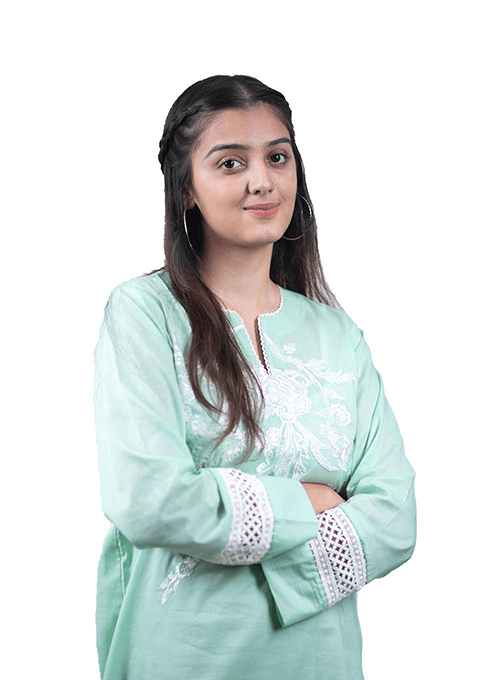
Syeda Aliza Sajjad
Aspiration Statement
I want to pursue a master’s degree in Social Policy to gain expertise in social work, development, and research. I wish to work in the development sector to challenge age-old laws that restrict minorities and marginalized communities from living freely
Core Skills
- Capacity Building
- Project Implementation
- Qualitative Research
- Training & Development | Monitoring and Evaluation
- Microsoft Office {Excel}
- Program Evaluation
- Digital Transformation
- Program Management | Program Design
- Digital Strategy
- Strategic Planning
- Design Thinking
- Python | STATA
- Critical Thinking
- Quantitative Research
Academic Awards / Achievements
- Dean’s List - Habib University - Fall 2018
Experience
Leadership / Meta-curricular
- TEDx Habib University, Co-lead Project
- Acting Workshop- Playground Habib University, Co-lead Project
Internship / Volunteer Work
- Team Lead, Technology for Education - The Citizens Foundation [Dec 2022 - Present]
- Consultant - UNDP [Mar 2022 - Feb 2023]
- Research Assistant - Aahung [Nov 2019 - Feb 2020]
- US Consulate Karachi, Intern, 2018
- SABAQ Foundation, Intern, 2017
- Circle Women, Intern, 2016
- Imkaan Welfare Organization, Intern, 2016
- Habib University Runway Radio, Student Employee, 2018-2019
- Interdisciplinary Development Research & Action Centre (IDRAC), Intern, 2018-2019
- Robinhood Army - Student Volunteer [Sep 2016 - Mar 2017]
Final Year Project
Project Title
Identity and Integration of Rohingya Women
Description
My thesis was exploratory research on the identity formation process among refugee Rohingya women that reside in Karachi. I explored the extent to which the idea of nationalism is influenced by masculinity to inform gender roles experienced by women. With interviews, speaking to the representatives of the Burmese Welfare Organization, and conducting field observations, this study intends to shed light on the struggles and perspectives of women in particular. I have predominantly drawn on a post-colonial and intersectional feminist theoretical lens to build a framework that keeps women at the centre of its argument. The narrative surrounding them and their process of identity formation is deeply rooted in their role as “secondary” members within a patriarchal structure, which may or may not be amplified in the process of displacement. There is minimum to no literature on the refugee Rohingya community of Pakistan, and even less so on women. My thesis aims to contribute to the body of knowledge about South Asian refugee women and present an informed analysis of their experience of them as migrant/refugees in Pakistan.